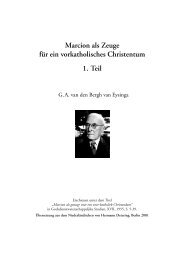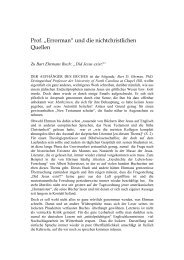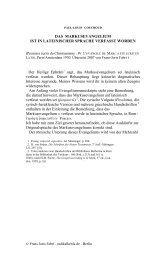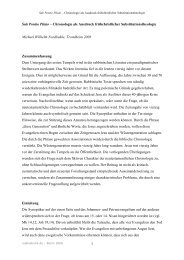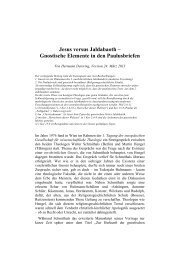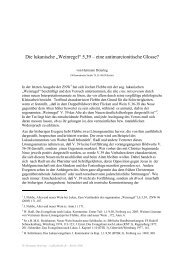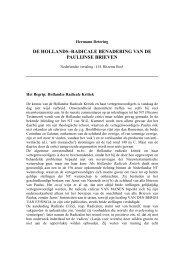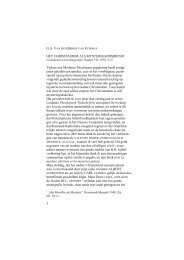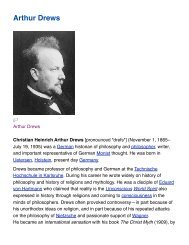Arthur Drews - Radikalkritik
Arthur Drews - Radikalkritik
Arthur Drews - Radikalkritik
Create successful ePaper yourself
Turn your PDF publications into a flip-book with our unique Google optimized e-Paper software.
- 14 -<strong>Drews</strong> expanded his views in Die Religion als Selbst-bewusstsein Gottes : einephilosophische Untersuchung über das Wesen der Religion, (Religion as Self-Consciousness of God: A philosophical inquiry in the Essence of Religion) 1906.Religions are conscious expressions of the Unconscious, and philosophy andreligion can finally be united. The absolute Spirit was not another separate entity, andHartmann and <strong>Drews</strong> rejected the idea of any personal God, and any mind-matterdualism. While proclaiming a need for the "religion of the future" to be a "concrete"Monism. The advocacy of this system of monism became <strong>Drews</strong>'s life program, thesubject of his philosophical/religious writings and his social activism in the FreeReligion movement which had been sprouting all sorts of cultural associations(Kulturbünde) in Germany, in the desire for a new religion anchored in European and,more specifically, German culture.<strong>Drews</strong> was plunged in the spirit of the time, with its infatuation with history, and thehistory of religion and mythology. The 19th century was the discovery of history —in the wake of the Edward Gibbon's monumental history of the Decline and Fall of theRoman Empire, the ideas of Hegel's historical Idealism which saw in History theimplacable march of the World-Spirit in The Phenomenology of the Spirit, thediscoveries of James Frazer about ancient religions in his Golden Bough, thediscoveries of Egyptology, and the revolution of Darwinism.6.2 Influence of Albert Kalthoff and Reconnection with Bruno Bauer's RadicalIdeas<strong>Drews</strong> derived some additional key ideas from Albert Kalthoff (1850–1906).[64] Kalthoffwas an active minister, who managed to marry three times in his short life, and revivedBruno Bauer's Christ Myth Theory, in his Das Christus-Problem. Grundlinien zu einerSozialtheologie (The Problem of Christ: Principles of a Social Theology) (1902) and DieEntstehung des Christentums. Neue Beiträge zum Christusproblem (1904). (Transl.1907, The Rise of Christianity).Kalthoff criticized the romantic and sentimental imageof Jesus as a Great Personality of history developed by German liberal theologians(including Albert Schweitzer). In Kalthoff's views, it is the early church that createdthe New Testament, not the reverse. The early Jesus movement was socialist,expecting a social reform and a better world, which fused with the Jewish apocalypticbelief in a Messiah. Kalthoff saw Christianity as a social psychosis. <strong>Drews</strong> acceptedKalthoff's ideas, but insisted that the original Christian socialism was religious, noteconomic.[65][66]6.3 Critique of Liberal Theology and its Romantic Cult of Great Personalities<strong>Drews</strong> did become an acerbic critic of the faulty historical methods of academictheologians. But he was not against religion as such, his critique of Judaism andChristianity focusing on the fact that they were just ancient, archaic, myths which hadbecome obsolete, and their concepts foreign to our mindsets in the modernscientific age. He opposed the Romantic cult of "great personalities", and thenaive attempt of liberal theologians like Albert Schweitzer to idolize a "historic Christ"as a "unique personality" which is simply the result of modern manipulations byscholars (as already demonstrated by Albert Schweitzer in his epoch-making book, TheQuest for the Historical Jesus, 1906).In Die Religion als Selbst-bewusstsein Gottes : eine philosophische Untersuchung überdas Wesen der Religion (Religion as Self-Consciousness of God: a PhilosophicalInquiry in the Essence of Religion) (1906), he saw the phenomenon of religion throughhis philosophical approach as the self-consciousness of God through the mind ofmankind. Godmen were to be replaced by God-mankind, an adaptation of GeorgFriedrich Hegel's World-Spirit.He had been outspoken in presenting his views on religion with extreme clarity in Ideaand Personality: Settlement of the Religious Crisis (the last chapter of The Witness ofthe Gospels, Part IV of The Witnesses to the Historicity of Jesus) — Modernism rules:mankind cannot let the present be still shackled by past superstitions of ancient


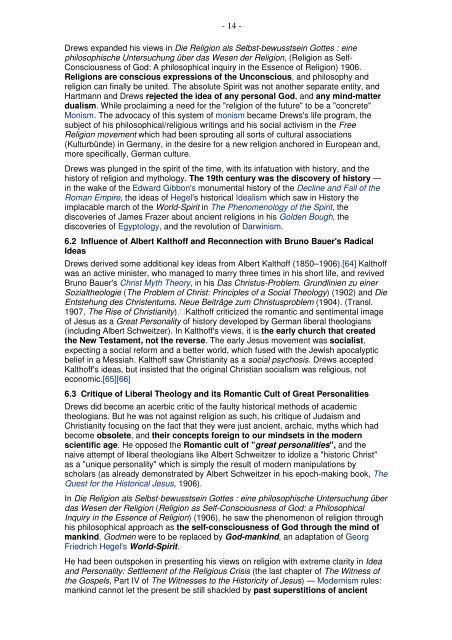
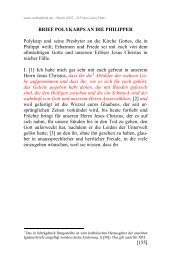
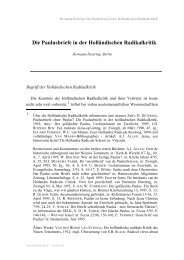
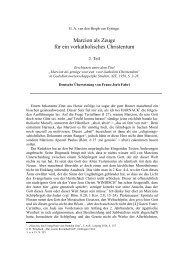
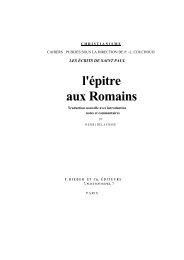
![[1] quibus tamen interfuit et ita posuit - Radikalkritik](https://img.yumpu.com/28285180/1/184x260/1-quibus-tamen-interfuit-et-ita-posuit-radikalkritik.jpg?quality=85)
